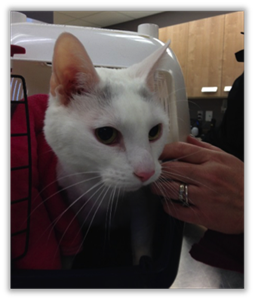This handsome male-neutered domestic shorthair kitty belongs to Shelley Seymour, our head receptionist. He recently spent a few days with us at Riverview Animal Hospital undergoing Radioactive Iodine therapy. He was diagnosed with hyperthyroidism, a condition where excess thyroid hormone (“T4”) is released into the bloodstream as a result of a benign growth on the thyroid gland, ultimately increasing the metabolic rate. The condition is not uncommon among older cats (Charlie is 14 years old) and causes symptoms such as weight loss despite an increased appetite, restlessness, seeking out extra attention or food, increased water intake, intermittent vomiting and diarrhea, and even blindness. Charlie was diagnosed early thanks to his very perceptive mom who brought him in for an appointment upon noticing some weight loss. Bloodwork was done, revealing high T4 levels.

Management of Hyperthyroidism in Cats
There are three options for management of hyperthyroidism in cats. Option one is life-long administration of an antithyroid drug called methimazole (Tapazole®). This medication stops the excess production of T4, but it does not affect the growth on the thyroid, just counteracts the extra thyroid hormone it produces.
Option two is surgery to remove the thyroid gland altogether. This option poses the highest risk to the cat, but does provide a cure for the disease. Removal of the thyroid may require life-long thyroid hormone supplementation to prevent subsequent hypothyroidism (not enough T4).
Option 3 is Radioactive Iodine therapy. The thyroid gland requires iodine to produce T4. When injected with radioactive iodine (I-131) the abnormal thyroid tissue takes it up and is then destroyed by the radiation, decreasing the amount of hormone released. Riverview Animal Hopsital is one of only two veterinary hospitals to offer this curative treatment in the Maritimes. After just one subcutaneous (under the skin) injection T4 levels normalize, boasting a 95-98% cure rate for hyperthyroidism. It takes up to a week for the radioactive iodine to leave the cat’s system, hence why Charlie needed to stay in hospital, in our specialized cat ward designed only for radioiodine therapy, for four days.
During his stay Charlie could not have visitors, due to radiation exposure, which was likely harder on his family than on him. Charlie’s a very affectionate kitty who loves his mom very much, never leaving her side, and is ever patient with Hailey and Molly, Shelley’s 9 and 7 year old daughters. Unfortunately he is not so friendly with the neighbour’s cat who he torments by sitting in her window. At home he is talkative and always in charge –even the dog knows not to mess with him!
It’s never easy on the family when a pet succumbs to illness, and making the right medical decisions can be challenging. Luckily there are effective treatment options for hyperthyroid cats. As in human medicine early detection is the key to successful disease management; regular check-ups and lab work is critical to the health of your pet, especially once they reach their senior years. For information on Senior Wellness packages, to book your pet in for a check-up, or for more information on Radioactive Iodine therapy call us anytime!